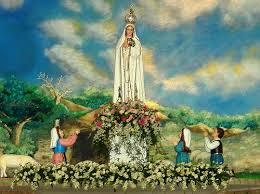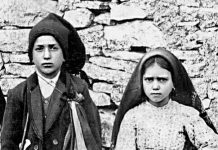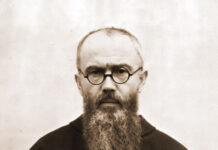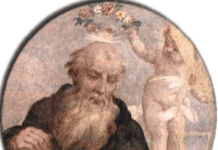The liturgical memorial of Our Lady of Fátima makes me realize how much Our heavenly Mother truly loves us. She comes to confirm us in our faith, warn us where necessary and show us the path towards her Son and our Lord Jesus.
Among the countless numbers of pilgrims, even Bishops of Rome went to visit the holy Shrine, each with his own way of approaching the one message of Fátima, namely that God wants to save humanity through his Son Jesus thanks to Mary. It is interesting to appreciate their various ways of driving home this one saving message.
Pope St John Paul II was very direct in his message. During his apostolic journey to Fátima on May 12-13, 2000, on the occasion of the beatification of Francisco and Jacinta Marto, shepherds and visionaries of Fátima, he spoke about the need that sinful humanity makes its return to Jesus. From his homily on Saturday, 13 May 2000 at Fátima:
The message of Fátima is a call to conversion, alerting humanity to have nothing to do with the “dragon” whose “tail swept down a third of the stars of heaven, and cast them to the earth” (Rv 12: 4). Man’s final goal is heaven, his true home, where the heavenly Father awaits everyone with his merciful love.
God does not want anyone to be lost; that is why 2,000 years ago he sent his Son to earth, “to seek and to save the lost” (Lk 19: 10). And he saved us by his death on the cross. Let no one empty that Cross of its power! Jesus died and rose from the dead to be “the first-born among many brethren” (Rom 8: 29).
In her motherly concern, the Blessed Virgin came here to Fátima to ask men and women “to stop offending God, Our Lord, who is already very offended”. It is a mother’s sorrow that compels her to speak; the destiny of her children is at stake. For this reason she asks the little shepherds: “Pray, pray much and make sacrifices for sinners; many souls go to hell because they have no one to pray and make sacrifices for them” (no. 3).
With Pope Benedict XVI, who visited Fátima during his apostolic journey to Portugal on the occasion of the tenth anniversary of the beatification of Jacinta and Francisco, we have the emphasis that this holy shrine is a “home” from which Mary is speaking to us today. Hence, God’s salvation comes to us through the Church, a praying Church who is interceding for humanity to be healed spiritually, psychologically and physically with Mary. Finally, Fátima is also a place where a missionary Church, thanks to her priests, consecrated people and all her sons and daughters who take Christ everywhere they go.
In his homily at the esplanade of the Shrine of Our Lady of Fátima on Thursday, 13 May 2010, Pope Benedict XVI said: “Their descendants shall be renowned among the nations […], they are a people whom the Lord has blessed” (Is 61:9). So the first reading of this Eucharist began, and its words are wonderfully fulfilled in this assembly devoutly gathered at the feet of Our Lady of Fatima. Dearly beloved brothers and sisters, I too have come as a pilgrim to Fatima, to this “home” from which Mary chose to speak to us in modern times. I have come to Fatima to rejoice in Mary’s presence and maternal protection. I have come to Fatima, because today the pilgrim Church, willed by her Son as the instrument of evangelization and the sacrament of salvation, converges upon this place. I have come to Fatima to pray, in union with Mary and so many pilgrims, for our human family, afflicted as it is by various ills and sufferings. Finally, I have come to Fatima with the same sentiments as those of Blessed Francisco and Jacinta, and the Servant of God Lúcia, in order to entrust to Our Lady the intimate confession that “I love” Jesus, that the Church and priests “love” him and desire to keep their gaze fixed upon him as this Year for Priests comes to its end, and in order to entrust to Mary’s maternal protection priests, consecrated men and women, missionaries and all those who by their good works make the House of God a place of welcome and charitable outreach...
In his profound homily, Pope Benedict XVI reminded us that God’s salvation comes when we give ourselves to others in selfless service. Even the wonderful testimony of Blessed Jacinta of interceding for sinners was an integral part of her life completely dedicated to God through helping his afflicted and suffering children. Pope Benedict XVI explains:
“Their descendants shall be known among the nations, […] they are a people whom the Lord has blessed” (Is 61:9) with an unshakable hope which bears fruit in a love which sacrifices for others, yet does not sacrifice others. Rather, as we heard in the second reading, this love “bears all things, believes all things, hopes all things, endures all things” (1 Cor 13:7). An example and encouragement is to be found in the shepherd children, who offered their whole lives to God and shared them fully with others for love of God. Our Lady helped them to open their hearts to universal love. Blessed Jacinta, in particular, proved tireless in sharing with the needy and in making sacrifices for the conversion of sinners. Only with this fraternal and generous love will we succeed in building the civilization of love and peace.
You and I are part of God’s salvific plan for the world through Fátima. We too are called to give our share, through the sufferings we go through, and unite them with those of Christ for the salvation of our world. We too feel responsible to let the Lord make our lives a truly authentic spiritual sacrifice:
We would be mistaken to think that Fatima’s prophetic mission is complete. Here there takes on new life the plan of God which asks humanity from the beginning: “Where is your brother Abel […] Your brother’s blood is crying out to me from the ground!” (Gen 4:9). Mankind has succeeded in unleashing a cycle of death and terror, but failed in bringing it to an end… In sacred Scripture we often find that God seeks righteous men and women in order to save the city of man and he does the same here, in Fatima, when Our Lady asks: “Do you want to offer yourselves to God, to endure all the sufferings which he will send you, in an act of reparation for the sins by which he is offended and of supplication for the conversion of sinners?” (Memoirs of Sister Lúcia, I, 162).
Finally, in Pope Francis’ perspective, the fact that Mary is our Heavenly Mother is a fact full of hope. She, as the Mother of Jesus and our Mother, never fails in supporting us in front of her Son, our Hope. In his homily during his pilgrimage commemorating the 100th anniversary of the apparitions of the Blessed Virgin Mary at Cova da Iria, on Saturday 13, May 2017, in a mass with the rite of canonization of Blesseds Franciso Marto and Jacinta Marto, at the Square in front of the Shrine of Our Lady of Fátima on Saturday, 13 May 2017, Pope Francis said:
Dear pilgrims, we have a Mother, we have a Mother! Clinging to her like children, we live in the hope that rests on Jesus. As we heard in the second reading, “those who receive the abundance of the grace and the free gift of righteousness exercise dominion in life through the one man, Jesus Christ” (Rom 5:17). When Jesus ascended to heaven, he brought to the Heavenly Father our humanity, which he assumed in the womb of the Virgin Mary and will never forsake. Like an anchor, let us fix our hope on that humanity, seated in heaven at the right hand of the Father (cf. Eph2:6). May this hope guide our lives! It is a hope that sustains us always, to our dying breath.
Confirmed in this hope, we have gathered here to give thanks for the countless graces bestowed over these past hundred years. All of them passed beneath the mantle of light that Our Lady has spread over the four corners of the earth, beginning with this land of Portugal, so rich in hope. We can take as our examples Saint Francisco and Saint Jacinta, whom the Virgin Mary introduced into the immense ocean of God’s light and taught to adore him. That was the source of their strength in overcoming opposition and suffering. God’s presence became constant in their lives, as is evident from their insistent prayers for sinners and their desire to remain ever near “the hidden Jesus” in the tabernacle.
Let us keep visiting Fátima. And may we keep experiencing, in different ways, the one message of God’s salvation which, as our Father, He will keep inviting us to embrace. May the powerful example of these three Popes encourage us taste and see that the LORD is good!
Happy is the man who takes refuge in him! (Ps 34:8).












